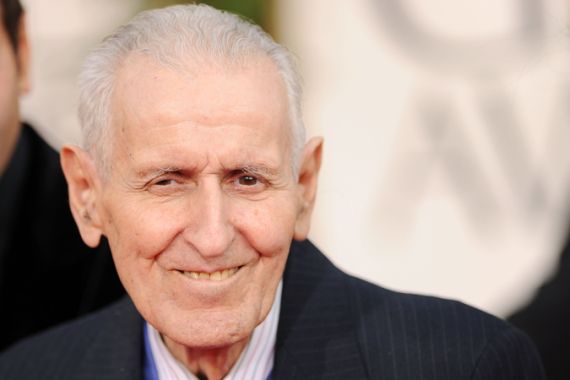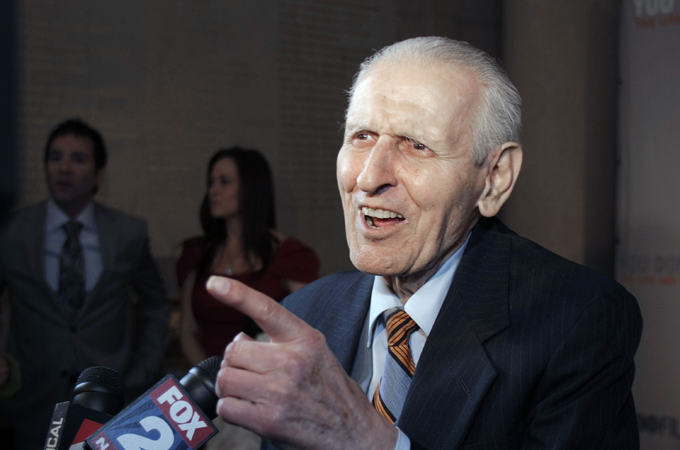‘Dr Death’ Kevorkian dies at 83
Controversial right-to-die activist who assisted more than 100 people in ending their lives passes away at US hospital.

 |
| Kevorkian was let off in four legal cases, but finally jailed for second-degree murder in 1999 [GALLO/GETTY] |
Jack Kevorkian, the advocate of assisted suicide who was known as “Dr Death” for having helped more than 100 people end their lives, has died at the age of 83, his lawyer announced.
Kevorkian died early on Friday morning at Beaumont Hospital in Royal Oak, Michigan, where he had been hospitalised for the past two weeks with kidney and heart trouble, Mayer Morganroth, an attorney and friend, said.
Kevorkian, who had previously been diagnosed with liver cancer, died from a blood clot that lodged in his heart, the Detroit Free Press reported.
Lauded and reviled
Kevorkian, a pathologist, was focused on death and dying long before he ignited a polarising debate in the United States over assisted suicide by crisscrossing through Michigan in a rusty Volkswagen van, hauling a machine to help sick and suffering people to end their lives.
He has been both lauded by his admirers as a hero who allowed the terminally ill to die with dignity, and reviled by his critics as a cold-blooded killer who preyed on those suffering from chronic pain and depression.
Most of his clients were middle-aged women.
“Dr Jack Kevorkian was a rare human being,” his longtime attorney Geoffrey Fieger told reporters on Friday. “It’s a rare human being who can single-handedly take on an entire society by the scruff of its neck and force it to focus on the suffering of other human beings.”
In 1990, Kevorkian launched his assisted suicide campaign by allowing an Alzheimer’s patient to kill herself using a machine he devised that allowed the patient themselves to trigger an injection of a lethal drug.
He was charged with first-degree murder in the case, but the charges were later dismissed.
Fiery and unwavering in his cause, Kevorkian made a point of thumbing his nose at lawmakers, prosecutors and judges as he accelerated his campaign through the 1990s, using various methods, including carbon monoxide gas.
Often, Kevorkian would drop off bodies at hospitals late at night or leave them in the motel rooms where the assisted suicides took place.
The doctor was declared not guilty four times in Michigan before he was finally convicted of murder in the second-degree in 1999, after a CBS news program aired a video of Kevorkian administering lethal drugs to a 52-year-old man who was suffering from debilitating amyotrophic lateral sclerosis (also known as Lou Gehrig’s disease).
“The issue’s got to be raised to the level where it is finally decided,” Kevorkian, who had provided the video to CBS, said during that broadcast. He also challenged prosecutors to charge him in that case.
In an interview, the man’s brother Terrence said his brother received “a medical service that was requested and, from my point of view, compassionately provided by Jack. It should not be a crime”.
Kevorkian was imprisoned for eight years, and a condition of his release in 2007 was that he was no longer to assist in any more suicides.
In a rare televised interview from prison in 2005, Kevorkian told MSNBC he regretted “a little” the actions that put him there.
“It was disappointing because what I did turned out to be in vain … And my only regret was not having done it through the legal system, through legislation, possibly,” he said.
He had appealed to leave prison early due to ill health, but said that he did not consider himself a candidate for assisted suicide.
He did not leave the public eye after his release from prison, giving occasional lectures and running unsuccessfully for the US Congress in 2008.
An HBO documentary on his life and a movie, “You Don’t Know Jack”, starring Al Pacino, brought him back into the limelight last year.
“Obitoriums”
Kevorkian was born in the Detroit suburb of Pontiac, and was well-read in philosophy and history. He cited Aristotle, Sir Thomas More and Pliny the Elder in his arguments for why people should be given the right to choose to die with dignity.
In a June 2010 interview with Reuters Television, the activist said he was afraid of death as much as
anyone else and that the world had a hypocritical attitude towards voluntary euthanasia.
“If we can aid people into coming into the world, why can’t we aid them in exiting the world?” he said.
Doctor-assisted suicide essentially became law in Oregon in 1997 and in Washington state in 2009. The practice of doctors writing prescriptions to help terminally ill patients kill themselves was ultimately upheld as legal by the US Supreme Court. In 2009, the Montana Supreme Court effectively upheld the legality of the practice in that state as well.
Kevorkian was first dubbed “Dr Death” by colleagues during his medical residency in the 1950s when he asked to work the night shift at Detroit Receiving Hospital so he could be on duty when more people died.
After the US Supreme Court permitted states to reinstate the death penalty in 1976, Kevorkian campaigned for performing medical experiments and harvesting the organs of consenting death row inmates.
Kevorkian’s ultimate goal was to establish “obitoriums” where people would go to die. Doctors there could harvest organs and perform medical experiments during the suicide process. Such experiments would be “entirely ethical spinoffs” of suicide, he wrote in his 1991 book “Prescription: Medicide – The Goodness of Planned Death.”
Fieger, Kevorkian’s former attorney, said that ultimately the doctor was too physically weak to be able to take his own life.
“If he had enough strength to do something about it, he would have,” Fieger said at a news conference in Southfield. “Had he been able to go home, Jack Kevorkian probably would not have allowed himself to go back to the hospital.”
Nurses played recordings of classical music by composer Johann Sebastian Bach for Kevorkian before he died, Morganroth said.